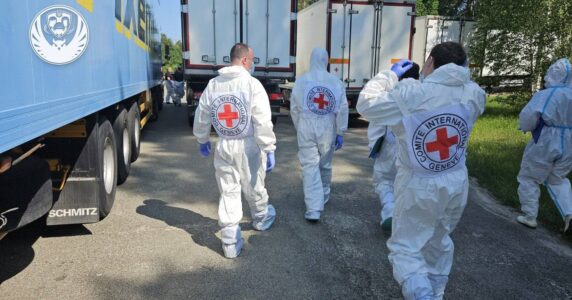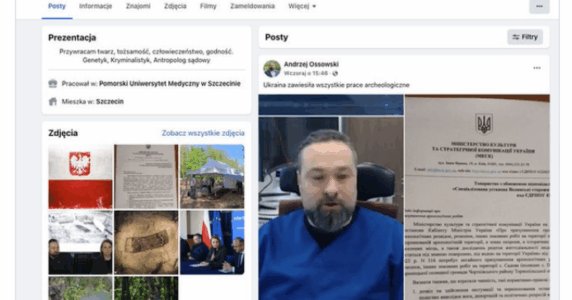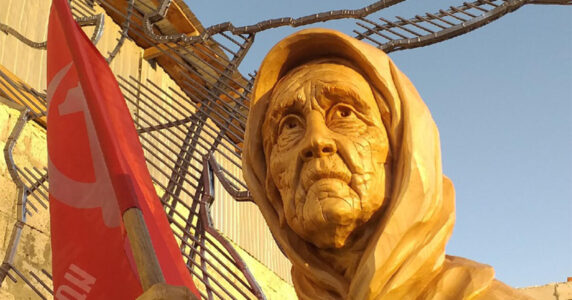Navigation and useful materials
Donetsk tank operators joined the Russian armed forces and are striking their own people. “Diffusing responsibility” as a new trend of Russian media space. The Centre for Strategic Communication and Information Security has collected the main fakes and narratives of the Russian propaganda of July 8-10.
- Military correspondents to be put in line
- Bad Buryats and good Slavs
- Federal fiction of Russia
- The last “Supreme Ruler”
Military correspondents to be put in line
The death of Russian soldiers in Ukraine as a result of activity of so-called Russian military correspondents has caused a major outcry.
The mothers of the soldiers of the military unit from the Astrakhan region, who died in Ukraine, blamed the correspondent of “Izvestiya” Trushnin for their deaths.
The collective appeal of women to the Astrakhan branch of “Soldiers’ Mothers” was published by Ilya Barabanov, a journalist of the Russian BBC service. This was reported by Novaya Gazeta Europe.
In the letter, they write: “After the release of Trushnin’s story on June 30, 2022, the positions of servicemen were shelled by heavy artillery of the Armed Forces of Ukraine. This happened because the video disclosed the location of the base of military equipment and personnel of the 1st platoon.”
As a result, five servicemen died, three more were injured and are now in grave condition.
The women asked the Committee of Soldiers’ Mothers of Russia to help in organizing an official appeal to Defence Minister Shoigu with the demand to ban the access of military correspondents to the frontline.
Of course, the “military correspondents” immediately became defensive. Military correspondent Kots said they had to be “taken back to their den.” Of course, he claimed that the appeal itself was fake.
IN REALITY, it has been no secret that in their propaganda carousel, the “field chroniclers of victory” engage in wishful thinking and hardly follow what they say or show. It’s enough to think about the official speaker of Russia’s MoD, Lieutenant General Konashenkov, with his victorious statistics.
In addition, occupiers’ units often come under friendly fire. One such victory over their own units took place near the settlement ironically called Neskuchne (“Not Boring”).
Basically, the Armed Forces of Ukraine are grateful to both the Russian military correspondents and the Russian artillerymen, who shoot at their own units from MLRS, for their fruitful cooperation in the destruction of the occupiers on Ukrainian soil.
The Committee of Soldiers’ Mothers, meanwhile, said they had not received this letter. But they admitted that since the beginning of the war, “more than 15,000 such appeals have been received. There are a lot of questions.”
In a story published on the Izvestiya website on June 30, Trushnin shows the “tank carousel strikes” of the Russian Armed Forces in the “DPR.” The video does have drone footage of the area.
After the appeal of Arkhangelsk mothers, he quickly buried his head in the sand, saying he “did not work with Russian servicemen, but with the Donetsk tank battalion Diesel. All the guys there are from Donetsk.”
Trushnin, of course, does not explain what the Donetsk tank battalion Diesel has to do with the Russian Armed Forces. Even to Arkhangelsk mothers. It is evident that such staged “carousel” footage is the entire essence of Russia’s “victory” in Ukraine, promoted by propaganda media.
Bad Buryats and good Slavs
There is one more interesting point in Trushnin’s explanation. He actually shifted the blame for the death of Arkhangelsk residents in Ukraine to the “Donetsk guys.” And this shifting of blame has gradually become the norm in the Russian media space.
“The Kremlin is good at avoiding responsibility, distorting and shifting everything to others. When the world learned about Bucha, Irpin, Moscow thought: what are we going to do? Of course, they wanted to somehow whitewash themselves. At least like this: we have ‘foreigners,’ Buryats, Dagestanis of all kinds. They have their own problems, they don’t quite listen to us. Nobody is actually saying it personally, but this idea is promoted on social media, on Telegram channels, on YouTube,” says Yevgeniya Baltatarova, a journalist from Ulan-Ude (the capital of Buryatia).
The Free Buryatia Foundation, which is conducting its investigation of Russian crimes in the Kyiv region, concluded that there were indeed some episodes.
“But it is incorrect to claim that the Buryats committed atrocities en masse. It is important to understand that there is no separate, savage Buryat battalion led by a Buryat who committed war crimes. There are no separate, purely Buryat formations, because the empire is afraid of riots on a national basis in its ranks,” explains Baltatarova.
The same applies to Kadyrovites, who are made into crazy bearded thugs in Russian media. This image should sow fear and panic both among Ukrainian defenders and among insufficiently motivated Russian occupiers. The latter is because “Putin’s Chechen allies” participate in the “re-education” of such soldiers.
IN REALITY, all these conversations mean one thing: the enemy is scared. In psychology, there is the concept called “diffusion of responsibility.” This is a phenomenon of subjective blurring of responsibility for any act between several members of the group. As a result, the level of responsibility of each member becomes much lower than the initial one. In addition, it becomes difficult to establish who is really to blame.
But it is no longer possible to hide responsibility. The war in Ukraine is called “the first non-anonymous war”. It is absolutely realistic to find all the soldiers and officers who committed atrocities on the territory of Ukraine. This is already being done.
And no matter how the propagandists try to convince us that “they are all wild Buryats, Chechens, Dagestanis,” the truth is that they are all residents (it is difficult to call them citizens) of the Russian Federation. And they are found and tried — and will be tried in the future — as Russians, not individual Buryats, Chechens or Dagestanis.
Federal fiction of Russia
Ironically, Ukraine’s victory may give Buryats, Chechens, Dagestanis, Tatars and other ethnicities within Russia a chance to become truly independent, not parts of a federation.
For example, this was emphasized by former president of Poland Lech Walesa. According to Le Figaro, he urged the West not to limit itself just to protecting Ukraine from the Russian invasion. They need to “liberate Russia itself.” Walesa is confident that without a complete change of the political regime in Moscow, global security can only be guaranteed by the dismemberment of the current Russian Federation, which remains imperial.
“There are 60 nations there, which were absorbed in the same way as Ukrainians are being absorbed today. We must help these peoples to rise up,” says Walesa.
IN REALITY, it is a well-known fact that the Russian Federation is largely fictitious. Even the Soviet republics of the USSR had more constitutional rights than places like Tatarstan have today. In the recent version of the Russian constitution, adopted for the “reboot” of Putin’s term in office, there was an article about “the indivisibility of the country’s territory.” That is, if even hypothetically, say, Kazan wishes to separate from Moscow and become independent, this is prohibited by the constitution and would entail major consequences.
The very essence of a federal republic assumes that the population of the regions forms the federation and determines the form of its power and administration, as well as the national ideology and national policy, external and internal.
Today, no one asks Russian regions about politics, they are not even informed about intentions and agreements both in the international arena and in matters of internal development. Governors of provinces, too, are appointed in the Kremlin.
The presence of dissidents and political prisoners among activists of national movements is the best illustration of national politics in the Russian Federation. And in this, the situation is strikingly reminiscent of Stalin’s Gulag.
Airat Dilmukhammetov, a former candidate for the State Duma and President of Bashkortostan, was first sentenced to three years in prison in 2011 for opposition journalism in the republican press. In 2015, was sentenced to three years in prison for a book he wrote even before the previous sentence. After his release, the activist spent only one and a half years at liberty. He was put behind bars again as soon as he publicly announced the need to restore the position of president of Bashkortostan (abolished in 2015) and his intention to run for it. The activist is still in jail for his dreams of a democratic and free Bashkortostan.
One day, Airat Dilmukhammetov and hundreds of other Russian political prisoners will be free and take their rightful place in society. People like Viacheslav Chornovil, Mustafa Dzhemiliev and Semen Gluzman have already gone through this.
Putin’s federation, on the other hand, will follow in the footsteps of the Soviet Union with its predictable end, when it ceased to exist as a subject of international law and geopolitical reality in 1991.
The Last “Supreme Ruler”
By the way, in the late Soviet Union, a new position was invented for the head of state — president. The first and last president of the USSR was Mikhail Gorbachev.
Something similar is happening in the late Russian Federation. But they want to go in the opposite direction: replace the Anglo-Saxon word “president” with a more “authentic” one, “ruler.” The initiative comes from the LDPR — Russian “liberal democrats”, who, as you know, are neither liberals nor democrats.
IN REALITY, the contemptuous term “ruler” is very frequently used in anti-Ukrainian Russian propaganda narratives.
If they introduce this position, the Kremlin will have to explain, how is their “ruler” better than the rulers of the nationalist “junta” in Ukraine? Not to mention other terminological clashes.
Then the government will have to be renamed, too. Boyar Duma? But there is already a State Duma. Cabinet of Ministers? But the position of a Prime Minister comes from the loathed Anglo-Saxons. And the word “minister” is not of Slavic origin, either. The entire terminology would have to be rewritten. Well — whatever keeps them busy.
Just in case, the Kremlin said that they have not yet decided on their attitude to the LDPR initiative. But considering the head of the Federation Council, Matvienko, wants to eliminate the majority of foreign words from the Russian language by law, the idea should be in line with the authorities’ preferences.
Maybe Putin really will be a “ruler”. The “supreme” one, to avoid any confusion.
On this occasion, let’s remember the fate of the first self-proclaimed supreme ruler of Russia, admiral Alexander Kolchak, who, in his own words, “put the war above the homeland.”
When he fled from Petrograd, he admitted that he “took with him two dubious values: a firm belief in the inevitability of a state catastrophe with a weak belief in some miracle that could prevent it, and moral emptiness.”
No miracle happened, and Kolchak was shot to death. On the ice of a small Siberian river, by personal order of Lenin.
So, the situation is hardly optimistic for Russia. No miracles will happen, no matter how much it hopes for one. And the court won’t care whether Putin calls himself a president, a secretary general, a tzar, an emperor or “the supreme ruler.”
If you have found a spelling error, please, notify us by selecting that text and pressing Ctrl+Enter.


